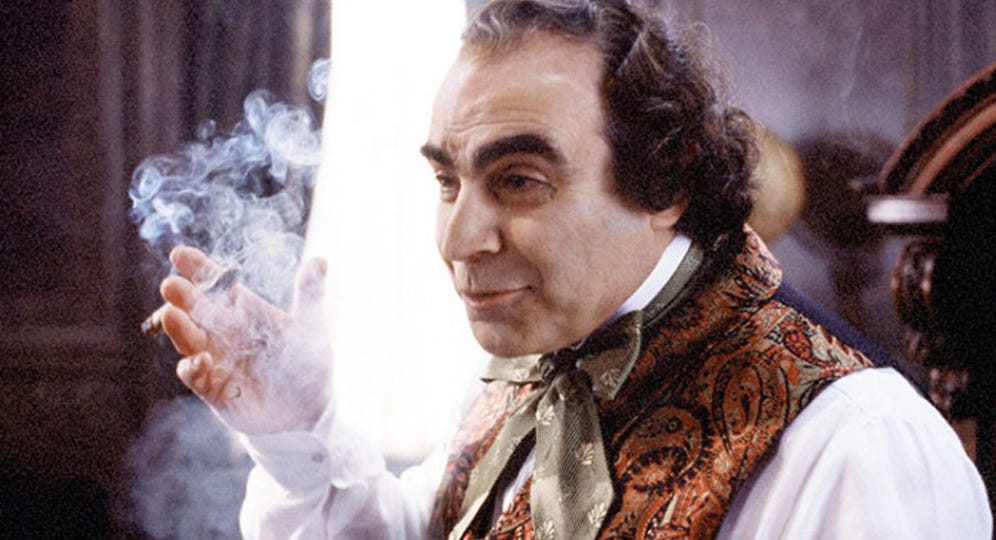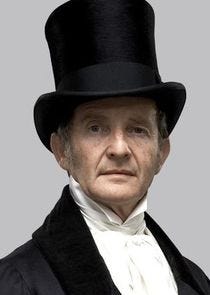In the 1980s I worked in the City (yes I am that old) and commuted everyday on the tube from Kew - and because I didn’t have arms long enough to hold out and read the obligatory FT, I read my way through the Victorian classics, thick paperbacks that would happily help me fill a forty minute journey twice a day. Trollope, Dickens, Eliot, Gaskell …I fell in love with them all, and wondered why I had given up studying EngLit so early (aged 16, in case you asked).
My ten years in London banking seemed to be one long decade of City scandals - aren’t they all? - Polly Peck, Guinness, Blue Arrow (my own particular misery as it affected my place of work and many people I held dear), Barings, The Mirror Group - and they all had an easily identifiable villain: Asil Nadir, who fled to Cyprus; Ernest Saunders, who achieved early release by pleading dementia, from which he subsequently recovered (!); Nick Leeson, a Watford ‘wideboy’; and the greatest crook of them all, Robert Maxwell.
The newspapers loved to thrill their readers with tales of fraud, conspiracy, theft, shady backroom deals, circles of intrigue, and the overwhelming stink of greed. And what the journalists particularly seemed to love was the trope of the man who had risen without trace to perpetrate these terrible deeds - although they all appeared at first glance to be ‘City scandals’, none of these crooks were, on closer inspection, ‘one of us’. Thank goodness for that. The fact that they had all sat on, or been supervised by, Boards packed with well-respected, well-connected, and well-paid City gents in the shape of non-executives, with blue-chip lawyers and accountants to advise them, could all be glossed over - the highly convenient ‘one bad apple’ theory of corporate governance.
I think these scandals made my reading of the Victorian novel more vivid. Trollope’s masterpiece, The Way We Live Now, would not be even half the book it is without the towering villain, Melmotte. Who, having read it, can forget Little Dorrit’s sinister Mr Merdle, and even Middlemarch has its corrupt, hypocritical banker, Bulstrode. What a coincidence: these are also all outsiders, mysterious men who have come from nowhere, but by the time they force their way into the novels, are so powerful and apparently so wealthy that Society had completely lost its mind, or power of judgement, and the fawning and pandering behaviour of stupid, greedy people fills us with horror. When disaster overtakes these liars and tricksters, it is all-encompassing, and their overthrow pulls down the good and the bad with them. The innocent suffer along with the idiots.
(The quotes below may seem long, but as they are both written by supreme masters of the English language, bear with me!)
Mr. Melmotte had made his wealth in France. He no doubt had had enormous dealings in other countries, as to which stories were told which must surely have been exaggerated. It was said that he had made a railway across Russia, that he provisioned the Southern army in the American civil war, that he had supplied Austria with arms, and had at one time bought up all the iron in England. He could make or mar any company by buying or selling stock, and could make money dear or cheap as he pleased. All this was said of him in his praise — but it was also said that he was regarded in Paris as the most gigantic swindler that had ever lived; that he had made that City too hot to hold him; that he had endeavoured to establish himself in Vienna, but had been warned away by the police; and that he had at length found that British freedom would alone allow him to enjoy, without persecution, the fruits of his industry. He was now established privately in Grosvenor Square and officially in Abchurch Lane; and it was known to all the world that a Royal Prince, a Cabinet Minister, and the very cream of duchesses were going to his wife’s ball. All this had been done within twelve months. (Trollope: The Way We Live Now)
THE famous name of Merdle became, every day, more famous in the land. Nobody knew that the Merdle of such high renown had ever done any good to any one, alive or dead, or to any earthly thing; nobody knew that he had any capacity or utterance of any sort in him, which had ever thrown, for any creature, the feeblest farthing-candle ray of light on any path of duty or diversion, pain or pleasure, toil or rest, fact or fancy, among the multiplicity of paths in the labyrinth trodden by the sons of Adam; nobody had the smallest reason for supposing the clay of which this object of worship was made, to be other than the commonest clay, with as clogged a wick smouldering inside of it as ever kept an image of humanity from tumbling to pieces. All people knew (or thought they knew) that he had made himself immensely rich; and, for that reason alone, prostrated themselves before him, more degradedly and less excusably than the darkest savage creeps out of his hole in the ground to propitiate, in some log or reptile, the Deity of his benighted soul. (Dickens: Little Dorrit)
Their very names seem filled with horror - Merdle looking very much related to a French expletive, and Melmotte probably derived from Melmoth The Wanderer, a Gothic novel of the 1820s about a man who has sold his soul to the Devil.
And of course, once these giants have fallen, there is no-one who will admit to having admired or even liked them in the first place:
He had sprung from nothing, by no natural growth or process that any one could account for; he had been, after all, a low, ignorant fellow; he had been a down-looking man, and no one had ever been able to catch his eye; he had been taken up by all sorts of people, in quite an unaccountable manner; he had never had any money of his own, his ventures had been utterly reckless, and his expenditure had been most enormous…Mr. Merdle was found out from the crown of his head to the sole of his foot, the moment he was found out in his pocket.
In 2001 the BBC filmed The Way We Live Now, and there was no doubt on whom the actor David Suchet was basing his powerful portrayal of Melmotte. It was only ten years since Maxwell had been found floating near his luxury yacht, and his business empire had collapsed around his sons’ ears, a tissue of lies and an appalling misuse of other people’s money. Accident or suicide? we will never know. In fiction, Melmotte’s end, drinking prussic acid, was brutal, and no-one would mourn his loss, not even his petrified and miserable wife and daughter. Merdle killed himself with his daughter-in-law’s penknife in the Turkish baths. Only Bulstrode escapes death, although he and his poor wife have to leave Middlemarch, with their tails between their legs. Eliot’s genius was for working out huge themes on a small canvas, and her villain and his punishment are trimmed to fit. But of the three, Bulstrode is the one, the pillar of his church, that we see connive at a man’s death.
For many years I wondered who Trollope, Dickens and Eliot had in mind when they created these extraordinary characters - that Victorian business life must have been equally dominated by mysterious shysters, conmen and frauds. Little Dorrit was published in 1857, Middlemarch and The Way We Live Now 1871 and 1875 respectively - three villainous bankers in less than twenty years. It is likely that the original Mr Merdle (the first of the three to be put down on paper - although I am not suggesting that Trollope and Eliot copied) was one William Strahan, convicted of embezzlement at his family-owned bank in 1855. However, although he was tried and found guilty, he was seen to be so much part of the Establishment that his original sentence of deportation was commuted and he was released after just three years, spending the rest of his life in comfort in Sidmouth and Italy.
There was another significant banking crisis in 1865, when Overend, Gurney & Co collapsed owing the equivalent of £1 billion in today’s money. For forty years it had been the biggest discount house in the world (effectively providing banking services to retail institutions) and was under the control of the well-respected Quaker, Samuel Gurney. But after his death in 1856, the remaining Directors, who thought they knew better, massively over-expanded, buying long term investments such as railways shares, which turned out to be highly risky, and left them with a liquidity crisis (does this sound familiar? if only bankers ever learnt from history…). They attempted to shore up the balance sheet by issuing shares to the general public, but the bank still failed and the Bank of England refused to step in. The Directors were tried for issuing a fraudulent prospectus, but presumably they looked so much like ‘The Establishment’, rather than ‘one bad apple’ of dubious foreign extraction, that as Wikipedia says ‘the Lord Chief Justice Sir Alexander Cockburn said that they were guilty only of "grave error" rather than criminal behaviour, and the jury acquitted them.’ So neither of these well-known cases provides either the sinister parvenu, or the grisly end, of the novels.
It is a well-known fact that the human brain is hardwired to find someone to blame, a scapegoat.1 Apparently, when things go well, our brains are happy to accept that it was probably a fluke. When things go badly, our brain tells us that it happened on purpose and looks for the culprit. And of course, we hope that the culprit will be as little like ourselves as possible. If the wrongdoer does look like us - maybe went to the same school, is a member of the same club - we bend over backwards to find excuses or cover it all up, blaming the system, the regulator etc. In fiction, the author can create a truly evil villain, and dole out suitable punishment, and it will be very satisfying to the reader. No plutocrats were harmed in the making of this story. So when financial journalists wanted to write about twentieth century banking scandals, they reached for the stereotypes created by the great novelists: mysterious men who had clawed or wormed their way into positions of power and wealth, and who could be brought crashing down, leaving the closed ranks of bankers and corporate suits unscathed. And nothing changes, and more financial disasters happen, and more innocent people suffer.
Harvard Business Review https://hbr.org/2022/02/blame-culture-is-toxic-heres-how-to-stop-it










Fabulous post. Thank you.
Don’t have anything to add at this point, but just a lovely post. I love these, & C19 novels are the best.